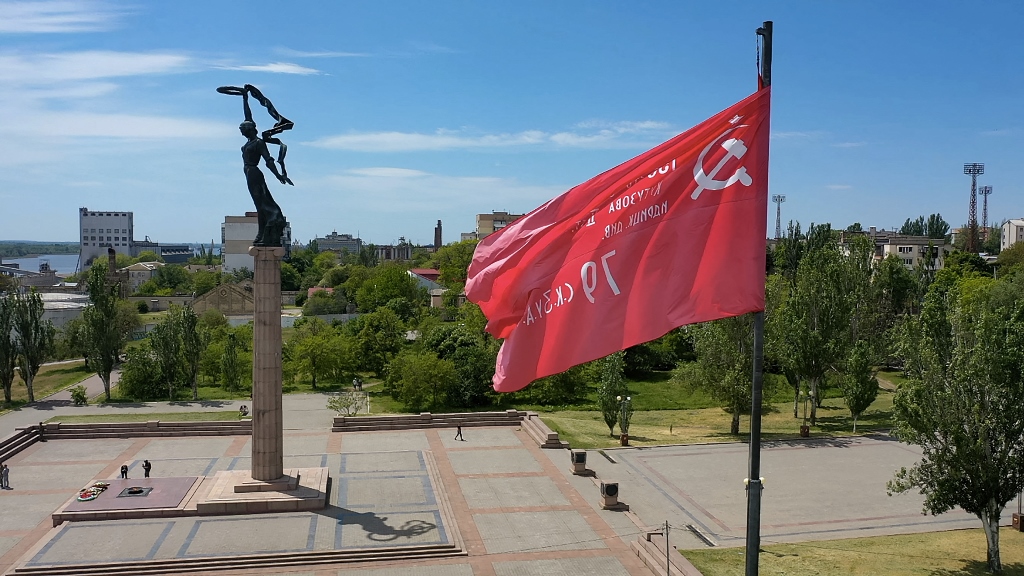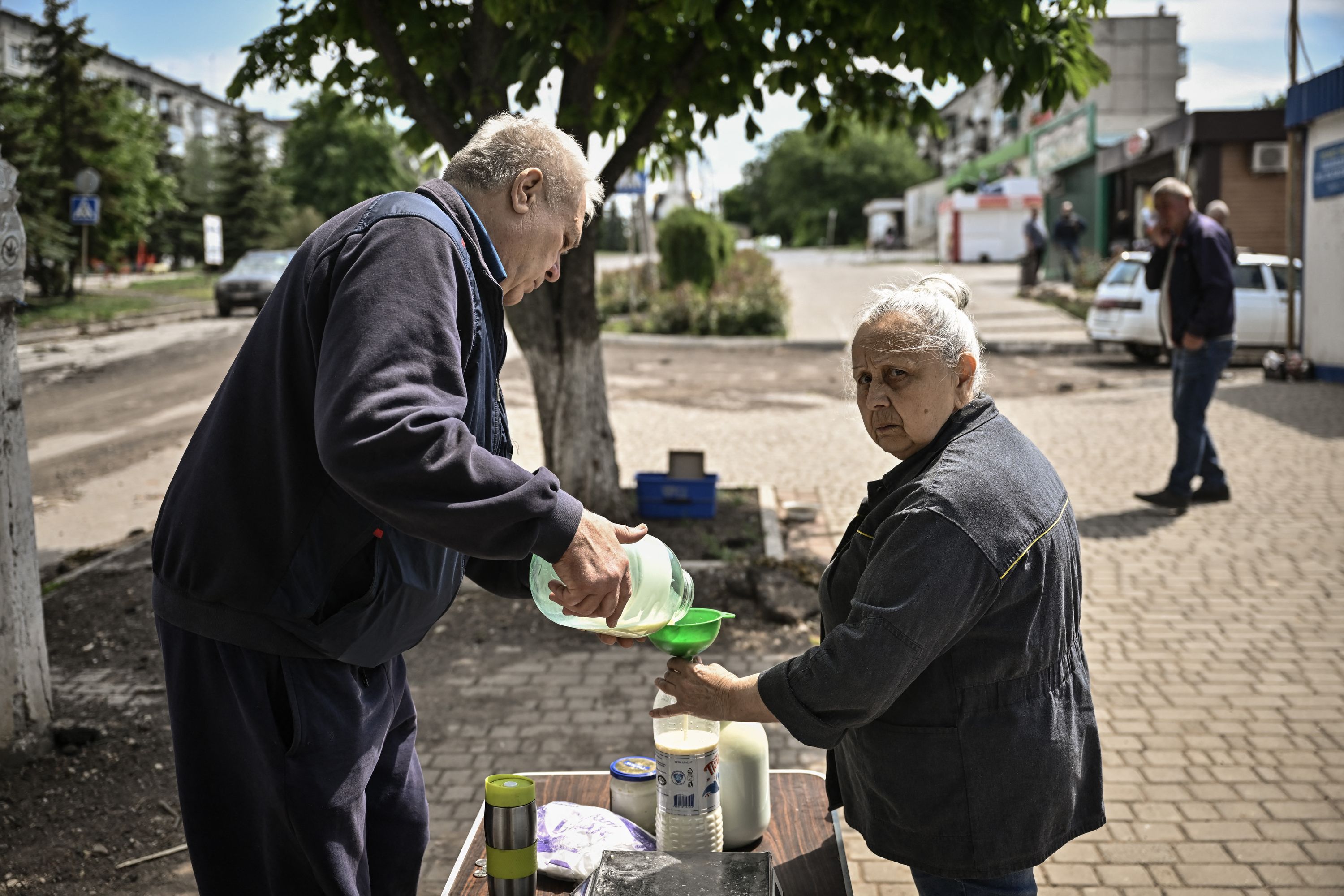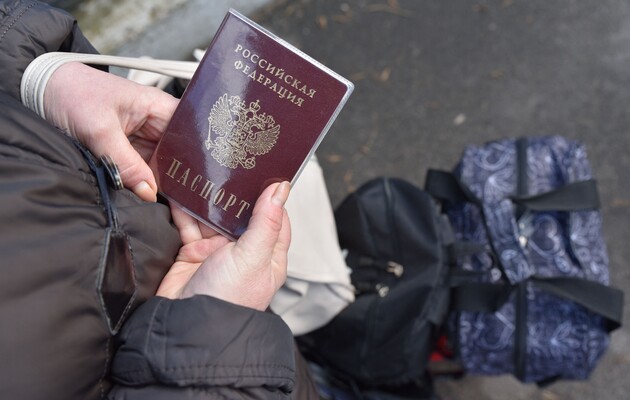Life according to ORDLO patterns
putin's decree on a simplified procedure for obtaining russian passports by residents of Kherson and Zaporizhzhya regions and yet another facilitated procedure for issuing the "eagles" in the temporarily occupied territories of Donetsk and Luhansk regions demonstrate the completion of the first chaotic period of occupation of new territories of Ukraine.
The shock from the critical shortage of welcoming flowers from the "liberated" population and the total absence of professionally trained and motivated collaborators seems to have dispersed. Russia has embarked on its traditional management model for the seized lands. Passport distribution still allows you to play with scenarios in non-public negotiations with the West ("well, we have issued passports, there is nothing to be nervous about, we have not annexed them yet"), but it creates dangerous baits to catch for Ukrainian citizens in the occupied territories. Today, they can still be simply the owners of a russian paper, necessary for survival, and tomorrow they will become "military obligated" and the cannon fodder for the new plans of the russian dictator. Passportization ‘a-la putin’ has already reached orphans from Ukraine, who may follow a simplified procedure to get a russian document.
Recent public statements by the representatives of the aggressor state and their subordinates resemble a peculiar competition for the best occupation ideas, where anyone who feels like it could compete. From the former holder of putin's seat, medvedev, who dis-attached from the nuclear war with the West and embarked on the problem of foreign currency exchange kiosks on the border of russia with the temporarily occupied territories of Donetsk and Luhansk regions, to the leaders of small peoples of russia and local traitors in the captured territories of Ukraine. The latter became the mouthpieces of the track about adjoining of Kherson and Zaporizhzhya oblasts directly to russia and the militarization of the occupied territories.
“We don't need a grey zone, we don't need the Zaporizhzhya People's Republic. We want to be a part of russia,” declared the representative of the occupation staff in Zaporizhzhya region, Rogov. Kherson Governor, Stremousov, urged to adjoin the region to the rf without any referendums, because this blessed innocence of a man does not want to waste time creating a picture for the West who still does not recognize, according to him, the "democratic" impulses of the occupier. Through the mouths of local collaborators, the kremlin voiced promising intentions to deploy its permanent military bases in Berdyansk and Melitopol. The ambitions and appetites of the occupier's local protégés increased noticeably when they eventually received the "official" status of "heads of military and civil administrations," after a long delay.
Competition in occupation-related creativity between russian stakeholders certainly deserves attention. Initiators need to be documented for prosecution, and the different voices in the occupier's camp often show different working scenarios of the kremlin leadership. However, behind this noise, it is important to remember one thing: russia is currently laying mines to prevent the future return of Ukrainian territories.

A copy of the Soviet Victory Flag flutters near the Great Patriotic War Memorial in Kherson on May 20, 2022, amid ongoing Russian hostilities in Ukraine. Getty Images
Humanitarian policy has become one of the first fronts of invaders in the occupied territories. The plan of "denazification of Ukraine" segwayed into the "plan of nationalization of the occupied Ukrainian territories". No one is going to camouflage the intention to clear everything Ukrainian in all the occupied territories — from Kherson to Rubizhne.
The occupiers create commissions and field teams to decimate public libraries in the newly captured territories of Ukraine, from where they remove books about the Holodomor as the "Nazi" literature. Even a children's book about the military feats of the princes of Kyivan Rus and the marches of the Zaporizhia Army has been labeled as "Nazi". The streets in the cities temporarily occupied by rf have been already renamed after Soviet punishers and secret service agents. Thus, Melitopol has received a Pavlo Sudoplatov Street, who was directly involved in the murders of Ukrainian intellectuals, politicians, and church leaders. Road signs with the names of cities and villages are subject to total "denazification" by the real russian Nazis.
As it has been the case in Donbas since 2014, Ukrainian children and young people were the first to fall under the rink of russian "high culture". russians are trying to instill in them their narratives. In this regard, russians can certainly not be blamed for lack of systemic approach. In the occupied territories, in addition to combating Ukrainian books and road signs, they are deploying a "jun-army" or putin-jugend. In Skadovsk, the occupiers held a youth forum where a clergyman demanded to close religious sects, and to introduce in all schools an Orthodox elective course "Once and for a lifetime". The centralized kremlin movement will unfortunately leave its trauma in the souls of Ukrainian youth on the TOTs, which Ukraine will still have to treat. An important component of the occupier's humanitarian offensive is the information blockade. Given the damage to telecommunication networks and the disconnection of cellular towers, residents have difficulties connecting with Ukrainian mobile communication and the Internet. One of the Crimean mobile communication carriers was brought to Kherson oblast, and local providers were forced to provide Internet services through russian servers.
Despite the "execution" threes in libraries, the occupiers feel the infirmity of the legend of their aggression and are forced to monkey Ukrainian symbolic manifestations of popular resistance and their positioning. You can laugh from the "postal" stamps in support of putin's "special operation" in Donetsk, when the heads of the occupation administrations were adjusting the comments of the head of "Ukrposhta" about the clamour around the stamp with the russian warship. However, such imitation demonstrates the poverty of the ideological dimension of the russian "special operation," which awareness, among other things, provokes the occupier to the savage destruction of books and road signs.
As a result of the self-isolation of the rf after the outbreak of the war and because of the sanctions, russians are losing the need to account for the economic consequences of their decisions in the temporarily occupied territories of Ukraine. They openly seize Ukrainian enterprises and misappropriate the facilities; and statements about the full economic integration of TOTs are becoming more ambitious in russia. Last week, the forum of putin's "United Russia" became an apotheosis of declarations of readiness to swallow the entire occupied territory. The vice prime minister of the russian government, murat husnullin, who holds meetings on the "restoration" of the territories destroyed by russia and the capture of the remnants of industry, is still the public face of economic aggression.
russians fail to explain to the newly "liberated" territories the seriousness of their intentions; they are hampered by one simple fact. During 2014–2022, in Donetsk and Luhansk, they did not even build a dog kennel. The gap between the promises and the reality has been confirmed by current practices in the newly temporarily occupied territories.
The economically depressed temporarily occupied territories of Donetsk and Luhansk Oblasts serve as a model for the development of the newly occupied territories, rather than the prosperous regions of the rf. The occupiers intend to integrate the banking systems of TOTs and the newly occupied Ukrainian territories. Kremlin's proxy, Saldo, announced the opening of the first branch of the "International Settlement Bank" (IRS Bank) in Kherson oblast, which now operates in the TOTs. Similar work is underway in the occupied territories of Zaporizhzhya region. The bank will operate on the basis of expropriated branches of Oschadbank.
Reproduction of the TOTs image is hard to explain now by the desire of russian companies to avoid sanctions — rf has become a "leper" for the civilized world. No conditionality are in question any longer. It would suffice to mention the barbaric removal of Ukrainian grain from Melitopol to Crimea, or the nationalization of private tourist infrastructure on the coast of Kherson region. The TOT model allows uncontrolled theft and enrichment from the people's disaster — this is the motivation to "scale up" the experience of the "LPR/DPR".

A woman buys milk from a street vendor in the city of Soledar in the eastern region of Ukraine (Donbas) on May 28, 2022. 94th day of Russia's invasion of Ukraine. Getty Images
If the financial system of the newly captured territories is coordinated with TOTs in Donetsk and Luhansk Oblasts, then the products and mobile communication will be coming from Crimea. In Kherson, after plundering Ukrainian supermarkets, new stores were opened — they are now filled with an assortment of russian goods coming from Crimea. By the way, a “pirate” or “taken over” supermarket has been a key symbol of the russian occupation since 2014. Victorious reports of the occupiers about the opening of the second (!) supermarket with smuggled goods in the once prosperous Mariupol is the absolute flashback to Donetsk and Luhansk in 2014–2015. They liberated you from life and the future — and opened a supermarket. It will certainly be used for profiteering by wives of russian curators and local swindlers, such as Zakharchenko and Plotnitski's teams did at the takeoff of the "republics". However, if truth be told, it should be admitted that the occupiers think not only of the benefits of taken over supermarkets. A football “Peace Cup” for schoolchildren is scheduled for June 1 in Mariupol, where russian officials will wear bulletproof vests. As the leader of the “special operation” once said, “we will stand behind their women and children.”
Equally disturbing is the dissemination of russian propaganda about the intention to persecute Ukrainian servicemen in the temporarily occupied territories. Last week, the heads of the "republics" boasted about the number of prisoners, and "prosecutor's offices" reported on the number of pseudo-cases opened against the defenders of Ukraine. Regretfully enough but the arrogant violations of the rights of prisoners of war and the solicitation of a pseudo-international “tribunal” over them, seem to be the occupier's realistic scenario. The objective is not only to execute the prisoners but also to continue the attempts to discredit and humiliate the civilized rules and institutions of the civilized world.
As shown by the analysis of the Permanent Representative of the President of Ukraine to the AR, Tamila Tasheva, putin's "special operation" has some unexpected effects in Crimea. The extent of repression against citizens on the basis of the "law on fakes about the armed forces of russia" testifies that even in territories under long-term occupation it is impossible to intimidate everyone. Even after the outbreak of the war, the imposition of unprecedented sanctions for the rejection of aggression against Ukraine does not help.
Thus, russia is trying to deploy a systematic policy of maintaining control over the occupied territories in all spheres and they are not limited to military means only. However, the advantage for Ukraine is that the aggressor can offer the residents of TOTs only their discredited passport with eagles, rather than a peaceful future.
Cover image: A woman holds a Russian passport while awaiting evacuation in Donetsk on February 19, 2022. © Getty Images
Original article in Ukrainian: zn.ua
